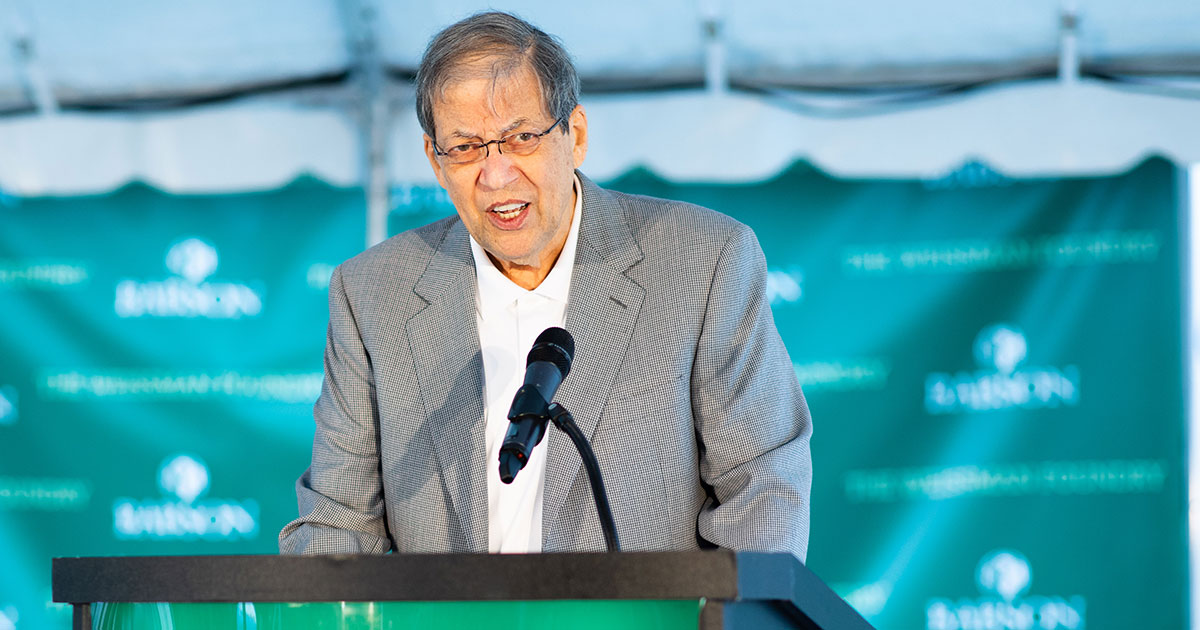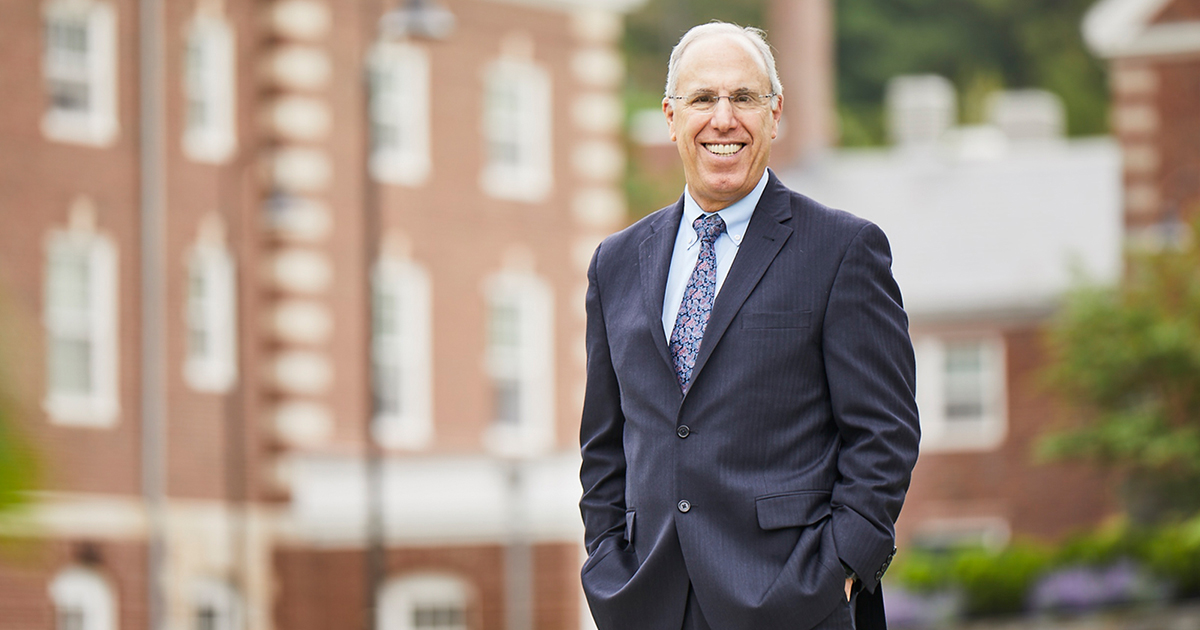Babson Remembers Beloved Community Member Bob Weissman

It is with a heavy heart that I announce the tremendous loss and passing of longtime community member Robert (Bob) Weissman ’64, H’94, P’87 ’90, G’19.
Bob, a technologist who helped usher in the information age, reveled in turning challenges into opportunities, and was driven by a vision of what was possible. His immense contributions to Babson College, as a dedicated alumnus and trustee, span generations. Bob was incredibly passionate about Babson—our people, programs, and potential. His unwavering commitment fueled his sharing of insights, knowledge, and resources that were indispensable in building Babson’s leadership in global entrepreneurship.
Bob and his wife, Janet Weissman P’87 ’90, G’19, have cumulatively invested a record of more than $100 million in the institution, transforming the educational experience for thousands of Babson students, alumni, and community members. Their generosity helped establish the Robert E. Weissman and Janet Weissman Chair, the first endowed professorship in business analytics, as well as fund Centennial Campaign projects including Babson Commons at Horn Library, the renovation and relocation of the Babson World Globe, and Kerry Murphy Healey Park.
In 2008, Bob’s philanthropy established the Weissman Scholarship program, which has provided full tuition for four years to nearly 60 students who are leaders in the classroom and the community. His unwavering commitment to our students was ever present during the early days of the pandemic when he was among the first to offer financial support for urgent student and community needs.
An ardent believer in the College’s mission and strategy, Bob once said, “Babson plays a vital role in advancing the work of family businesses, of businesses led by women, of businesses that promote the common good for all people, and of entrepreneurs of all kinds.” In recognition of the family’s support and commitment, Babson College’s Weissman Foundry, a state-of-the-art collaboration and innovation space for learning and hands-on experimentation, was named in his honor.
An ardent believer in the College’s mission and strategy, Bob once said, “Babson plays a vital role in advancing the work of family businesses, of businesses led by women, of businesses that promote the common good for all people, and of entrepreneurs of all kinds.”
For more than 40 years, Bob was an integral member of our Board of Trustees, serving in a number of capacities including Vice Chair of the Board, Vice Chair of the Corporation, multiple Committee Chair roles and Executive Committee Member. He co-chaired the Presidential Search Committee that hired Leo I. Higdon Jr. H’07 as the 10th President of Babson College, and, in 1994, Bob received an Honorary Doctor of Laws Degree.
Bob was a consummate statesman with quiet and consistent leadership who was always stepping in to help lead whenever Babson needed it most. His steady and calm demeanor was respected by all who came to know Bob, and many sought him out for his sage advice, warm and honest feedback, and his quick wit and timely humor. Our condolences go out to Janet, their children, and the family. A beautiful tribute to Bob may be found below.
I am honored to have known Bob, and to have called him a friend and trusted advisor. I will miss his presence in our community, and I know many will miss him as well. His support of Babson College will forever live on through the impact our alumni and students have made, and will make, on the world.
Robert E. Weissman: Pioneer of the Information Age, Accomplished CEO, Philanthropist, and Ham Radio Enthusiast
April 6, 2023—Robert E. Weissman, former Chairman and CEO of Dun & Bradstreet, IMS Health, and Cognizant, passed away on Tuesday, April 4, 2023, from cancer. He was 82 years old. Throughout his illustrious career, Weissman helped his shareholders gain more than $120 billion in capital appreciation and create over 300,000 jobs.
Early Years & Education
Robert Weissman grew up in New Haven, Connecticut, a bright, but restless student. Weissman was “invited” to leave his public high school, but was fortunate enough to earn a need-based scholarship to Worcester Academy. This generosity would impact his later philanthropy.
Weissman attended the University of Connecticut (UCONN) but dropped out twice due to a lack of funds and a feeling the school wasn’t educating him sufficiently. The first time he dropped out, he worked for Olin Mathieson Chemical Company in New Haven, a nuclear fuel research lab where he wrote three patents in electron optics at the age of 18. The company encouraged him to pursue a degree in physics, so he returned to UCONN only to drop out again. He stayed on campus and worked as an engineer at a nearby radio station. It was during this time, he met his wife Janet, who was a student there. That summer, at 20 years old, the two married, and Weissman became the chief radio engineer of a chain of radio stations in the Midwest.
In 1961, after encouragement from his father to complete a college education, Weissman applied to Babson College, which was exceptionally accommodating to his economic situation. He became involved in all aspects of college life and flourished at Babson. After graduating, Weissman’s career progressed rapidly.
Career
Robert Weissman started his remarkable career as the assistant to the President of Lestoil, a division of Standard International Corporation. While there, Weissman also served as controller of Rex Packaging and President of Dickerman Manufacturing. After Standard, Robert Weissman became President and CEO of Spencer-Kennedy Laboratories, a cable technology company that later sold to Scientific Atlanta, which was later rolled up into what today is Cisco. He also served as Executive Vice President of Rediffusion, Inc., a manufacturer of communications equipment and computers.
In 1973, Robert Weissman joined National CSS (NCSS), a computer time-sharing company (the mainframe equivalent to Amazon Web Services), where he eventually became president and CEO. In 1979, he sold that company to Dun & Bradstreet Corporation (D&B). In 1984, Weissman became President and COO of D&B and Chairman and CEO in 1993. Dun & Bradstreet Corporation, founded in 1841, grew to become the largest information and market research company in the world, with 72,000 employees in 114 countries, during Weissman’s tenure.
In January of 1996, Weissman surprised Wall Street and boldly broke the highly profitable company into three businesses: Cognizant Corporation, Dun & Bradstreet Information Services, and A.C. Nielsen. Within five years of divestiture, these businesses had increased their combined market capitalization by 13-fold, to over $120 billion. Today, these companies generate over $40B a year in revenues.
Over the course of his career, Robert Weissman oversaw over 200 acquisitions or divestitures. After the break-up, Weissman ran Cognizant Corporation, which included IMS International, a global supplier of marketing information to the pharmaceutical and health care industries; Nielsen Media Research, a leader in audience measurement for electronic media organizations, and the Gartner Group, a provider of advisory services to high-technology companies. Two years later, he would break up Cognizant, creating separate companies, IMS Health (now a part of IQVIA), Nielsen Media Research, and Cognizant Technology Solutions. Weissman would end his career as the Chairman and CEO of IMS in 2001.
Impact on the Industry
According to leading technology magazine, InformationWeek, Weissman’s “thoughts and perceptions shape not only his company [D&B], but the Information Age itself. … Weissman is the executive who best understands the links between technology and business.” Whether it was underlying computing and communications infrastructure technologies; digitized databases from D&B Credit, Moody’s, Nielsen, or IMS Health; or influential market research companies such as Nielsen Media or Gartner Group, Robert Weissman’s companies shaped how companies gather, digitize, distribute, or analyze information.
Over his career, Robert Weissman was a Board of Director of 11 public companies, including D&B, Cognizant Corporation, IMS Health, State Street Bank, Information Services Group, Cognizant Technologies, and Pitney Bowes. Weissman was also heavily involved in industry-shaping organizations, such as the Information Technology Association of America, ADAPSO, and the World Computer Services Congress, where he was chairman. These associations shaped the technology industry as we know it.
Weissman was also an active member of the U.S.- Japan Business Council (USJBC), the Business Roundtable, and No Labels, an American political organization supporting centrist, bi-partisan policies and politics.
Philanthropy
Robert Weissman was a philanthropist and impact investor who dedicated his time and money to help grow the next generation of leaders who will solve the world’s biggest problems.
The largest beneficiary of Bob’s philanthropy was Babson College, where he established scholarships to allow some of the best and brightest high school entrepreneurs in the world to enjoy the Babson experience. He also invested heavily in Babson’s infrastructure, assuring they are prepared to face the challenges of the 21st century. Bob served on the Board of Trustees for over 40 years, eventually becoming Vice Chairman.
Weissman’s commitment to entrepreneurship wasn’t limited to Babson. In addition, Weissman and his wife, Janet, donated generously to their high school alma maters, Worcester Academy (Worcester, MA) and the Williams School (New London, CT.). Weissman was also involved with NFTE—the Network for Teaching Entrepreneurship, a global educational nonprofit focused on bringing the power of entrepreneurship to youth in low-income communities as well as the Committee for Economic Development (CED), a nonprofit organization that aims to promote entrepreneurship as a key driver of economic growth and job creation in the United States. As of today, these organizations have educated more than 1 million young people worldwide.
Outside of Work
Weissman first became a ham radio amateur in 1953. At 15 years old, he became the second-youngest First Class Engineer licensed by the FCC. By the time he was 20 years old, he was the chief engineer overseeing a chain of radio stations in the Midwest. His passion for ham radio never waned. Well into his retirement years, Weissman would participate in The National Association for Amateur Radio Annual Field Day. He and 40,000 of his fellow hams would set up temporary transmitting stations in public places to demonstrate ham radio’s science, skill, and service to our communities and our nation.
In his 20s, Weissman became a licensed pilot and showed a passion for photography—even building a dark room in the basement of his home.
Weissman was also a student of humor and over the course of his life built a database of over 14,000 jokes. He combined a passion for golf with his love of jokes and self-published a 400-page golf joke book just for his friends and family.
Robert Weissman is survived by his wife of 62 years, Janet, his three sons, and seven grandchildren. In lieu of flowers, contributions would be gratefully accepted in his memory at Babson College.
Click this link for ways to give or send a check to the following address:
Office of Alumni Engagement and Annual Giving
Cruickshank Alumni Hall
231 Forest Street
Babson Park, MA 02457
Posted in Community






